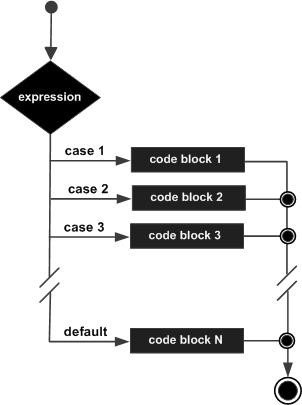switch statement in c
- A switch statement allows a variable to be tested for equality against a list of values. Each value is called a case, and the variable being switched on is checked for each switch case.
- The switch statement is a multi-way branch statement. In the program, if there is a possibility to make a choice from a number of options, then structured selection is useful.
- It requires only one argument of any data type, which is checked with number of case options.
- The statement evaluates expression and then looks for its value among the case constants.
- If the value matches with the case constant, this particular case statement is executed. If not, default is executed.
- Here switch, case and default are reserved keywords. Every case statement terminates with ‘:’.
- The break statement is used to exit from current case structure. The switch()statement is useful for writing menu driven program.
Syntax:
switch(integer expression)
{
case constant 1 :
do this ;
case constant 2 :
do this ;
case constant 3 :
do this ;
default :
do this ;
}
Flow Diagram:
Example:
#include <stdio.h>
int main()
{
int num=2;
switch(num+2)
{
case 1:
printf("Case1: Value is: %d", num);
case 2:
printf("Case1: Value is: %d", num);
case 3:
printf("Case1: Value is: %d", num);
default:
printf("Default: Value is: %d", num);
}
return 0;
}
Output:
Default: value is: 2
